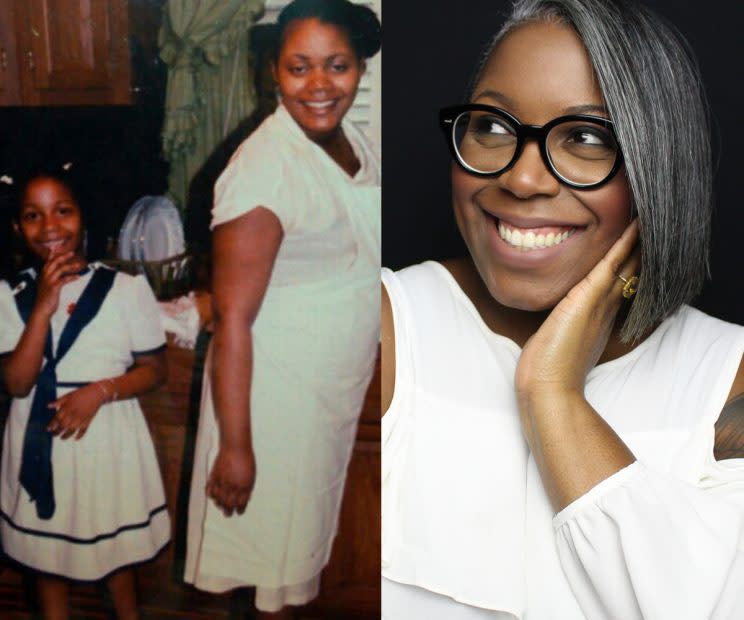Mother’s Day Without Mom: ‘It’s a Day of Reckoning for a Lot of People’

With Mother’s Day comes plenty of predictable clichés: overpriced brunches, last-minute flowers, and simmering resentment over the entire forced-celebratory deal. But for many people — especially those living without a mother for any of a variety of reasons — the day can trigger feelings ranging from isolation to profound pain.
“It’s sort of a day of reckoning for a lot of people — people whose mothers are abusive, absent, addictive, pathological,” Barbara Greenberg, a Connecticut-based psychologist whose own mother died tragically and unexpectedly when she was just 10 years old, tells Yahoo Beauty.
“What I’ve learned is that the tragic death of your mother is not a single event, but something that affects you for the rest of your life,” Greenberg says, speaking personally. “I’ve had moments of deep sadness, and of shame, because nobody seems to want to talk to you about it. Nobody ever looks at you with the kind of pride your mother does, if you were lucky enough to have had that kind of mother.”
Sadly, plenty do not, and they are faced with sadness or shame over being estranged from their mothers; others must make trips to prison if they want a Mother’s Day visit. And for some, not having a mom on the holiday is not the source of pain at all, but simply an acceptable feeling of otherness.
“At my elementary school, every year on Mother’s Day they’d have us make cards,” says Jean Azar-Tanguay, 16, who has two dads and lives in Boston. “Typically, when that happened, I’d make a card for my grandma or my babysitter, because both of them acted as female role models for me.”

Azar-Tanguay tells Yahoo Beauty, “My dads have always been my dads. I was born via IVF and surrogacy, so my bio mom didn’t actually carry me. The funny part about my story,” she says, “is that one of my dads is my bio dad, and the other is my bio uncle. My bio mom is my dad’s sister. To me, though, my dads have always been my dads and my bio mom has always been my aunt, because that’s what they are.”
But, she adds, “I never celebrated Mother’s Day with either… Teachers always supported me because again, I live in a very welcoming city and neighborhood. They’d always offer another option or just let me make something for my grandma.” Azar-Tanguay tells Yahoo Beauty that while the day is a source of gift stress for many of her friends, for her family “it really is a nothing day. We don’t do anything special.”
In anticipation of Mother’s Day, Yahoo Beauty spoke with a range of others about what sorts of feelings the holiday brings up and found answers ranging from anger and sadness to pain and guilt.
“I would be lying if said I didn’t experience a twinge of guilt that she is likely all alone on Mother’s Day and many days,” says Maria (not her real name), a mother of two who lives in Brooklyn and has been estranged from her mom for over a decade because of a toxic and “fraught” relationship that she says was defined by her mom’s highly narcissistic, abusive anger.
“I don’t send my mother cards anymore, and she certainly doesn’t send me cards. I consider being a mother my, and anyone’s, greatest privilege in life, so mostly I feel she lost out, and how sad it is for her. I am also angry with her for squandering the opportunity.”
As for Maria, though, “Mother’s Day isn’t a huge deal to me, because everything was always about my mother growing up,” she says. “I don’t want my children to think that at all.”

For those whose mothers have died, though, particularly when they were children — and especially if their relationship had been a good one — the day, and even the weeks leading up to it, can feel harrowing.
“It’s been more than a decade, but even a Hallmark holiday can drag me into that dark hole that I sometimes feel like I’m precariously teetering on the edge of,” says Lauren Tuck, 27. Her mom died tragically in a car accident — along with her “two other most prominent female figures” in life, her aunt and her grandmother — while the entire family was vacationing in Mexico and Tuck was just 14.
“My mother died just days before Christmas, so that time of year is really raw. Because of my job, Mother’s Day comes in second,” says Tuck, an editor at Yahoo. “We plan stories months out, and I attend story meetings where people discuss their parents. It makes me uncomfortable, but I’m pretty skilled at tuning it all out. I imagine if I worked somewhere else, the triggers would be less pervasive — I rarely shop in stores, don’t have cable TV, and use ad blockers.”
Because her father remarried years ago, she’s had a close relationship with her stepmother. “I love her so much and appreciate her friendship, guidance, and love,” Tuck says. “I try to show and tell her how much I care about her in other ways than a cheesy drugstore card, and on days other than Mother’s Day. I have three biological siblings (and two stepsisters), and she’s generally always been very careful and aware of how we might feel.”
Mary Torrence Williams, of Georgia, also lost her mom — a single mother — when she was 14. “I was a teenage girl in a small rural town, which I hated, with a lot of big dreams about my future,” she shares with Yahoo Beauty. “The death of my mother made me wonder if I could actually pull off any of these dreams, and what might happen to me and my siblings. The loss of my mother left me feeling really sad for a very long time. It was a sense of loss and emptiness that is very hard to explain.”

She wound up being raised by her oldest sister, who was just 21 at the time, and Williams says she still feels guilt about her sibling’s sacrifice. As far as the upcoming holiday, she shares, “Until I had a child of my own, I hated Mother’s Day. It served as one more reminder that my life was so much different from that of my friends.”
Williams has since founded a nonprofit, Students Without Mothers, which includes a scholarship program, as a way to help young people in similar situations feel less alone.
Similarly, popular blogger Ty Alexander has written a book about the recent death of her mother — Things I Wish I Knew Before My Mom Died: Coping With Loss Every Day — with the intention of supporting others through grief.
“For me, social media makes Mother’s Day especially hard,” Alexander, whose mother died of cancer four years ago, tells Yahoo Beauty. “Seeing all of the mom-daughter pictures with loving messages attached can be extremely triggering. I usually post my obligatory ‘Happy Mother’s Day to all’ and then log off. It can be a lot to continually scroll through that kind of pain.”
She adds, “Honestly, at this point, it’s all just really difficult. Every day I wake up it’s like I’m starting over. My brain remembers that she’s gone. Holidays are just amplified pain for me.”
But while fresh losses will sting their survivors on Sunday, years-old wounds can feel new again, too.
“It’s been over three decades, and it’s still very raw when holidays hit, especially Mother’s Day,” psychologist Greenberg says. “You always have that sort of empty-chair syndrome. It’s a very strange and triggering day. It’s very lonely — there’s anger, sadness, a feeling of ‘why me?’ I do avoid social media that day, because it can feel very isolating.”
Greenberg suggests that those upset by Mother’s Day might want to consider staying off of Facebook, along with the following:
Create a ritual. If you prefer being alone with your sadness, she suggests, “make it your day” by opting to do something that makes you feel good. If you like be around others, perhaps find a way to “connect with somebody who also loved your mom.” (Alexander shared that she’ll be celebrating her mom along with another friend of hers who lost her mother. “We’ve written letters to our mothers, which we will put inside of balloons and then send them off to heaven,” she says. “It makes me feel all warm inside to think just maybe they will reach her.”)
Don’t minimize the emotions of others. People who have not lost their mothers, but are not speaking to them or celebrating for whatever reason, probably wish they could connect. So empathy goes both ways. “Like I should not say to someone, ‘Oh God, you’re so lucky to have your mother,’ which could make someone feel terrible,” Greenberg says.
If you know someone who is missing his or her mother, try to be inclusive. “Give them the opportunity to join in any celebration you have,” she says. “They can always say no.”
Allow yourself to feel. “It’s OK to cry and get upset,” Greenberg stresses to those who are grieving. “Most of us never get over it,” she adds, “but instead learn how to live with it.”
Read more on Yahoo Beauty + Style:
After HIV Stigma Killed Her Baby, Mom on a Mission to End Pediatric AIDS
Motherhood Doesn’t Look as Glamorous as I’d Hoped. But I’m in a Battle for My Children’s Lives
Meet the Woman Who Guides Parents Through Their Darkest Days
Follow us on Instagram, Facebook, and Pinterest for nonstop inspiration delivered fresh to your feed, every day. For Twitter updates, follow @YahooStyle and @YahooBeauty.

